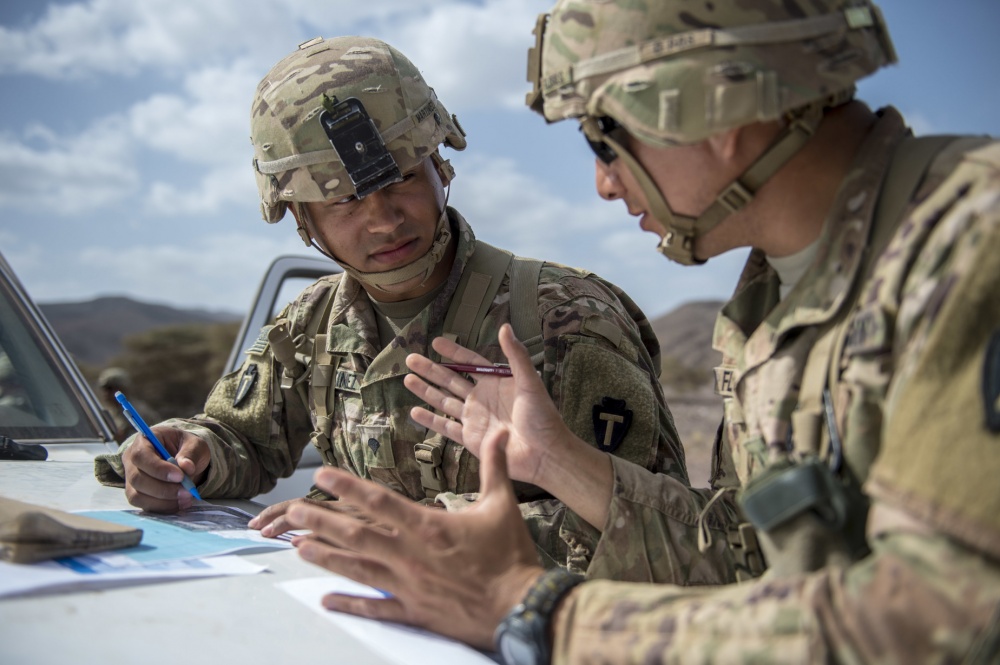
A U.S. Marine is awarded a Navy and Marine Corps Achievement Medal during a regularly scheduled deployment, July 14, 2018. (U.S. Marine Corps photo by Cpl. A. J. Van Fredenberg)
This post is part of a year-long series, The Paradox Problem. You can go here to see the introduction to the series, and see all the articles in the series here.
There are hundreds of adjustments that service members have to make when they leave the service; occupation, location, environment and countless others big and small. Transition support programs do a good job at focusing on the external aspects of transition, such as dressing for success and interview skills. They don’t often focus on helping service members change how the think, which is arguably just as significant to post-military success.
One of the key aspects of a service member’s mindset shift is how we deal with recognition and taking credit. In the military, there are individual awards and recognition, and these are often more well-known than collective unit recognitions. But when it comes to taking credit for something, receiving acknowledgment for a job well done, the credit for something good is often given to the group rather than the individual. That is not necessarily the case in post-military life. This can lead to the Taking Credit paradox.
This is the Taking Credit Paradox:
While in the military, any beneficial credit is given to the unit or team; in post-military life, veterans are expected to accept individual credit for their efforts
It can be awkward or uncomfortable for veterans to accept or acknowledge personal compliments, which can possibly speak to their self-esteem and self-worth. Resolving the Taking Credit paradox can improve self-worth and make post-military life much more pleasant.
While In the Military, Any Beneficial Credit is Given to the Unit or Team…
In the military, there is a unique blend of a desire for individual achievement and deflection of credit for the good of the team. Credit is usually reserved for behind-the-scenes reasons…a point that supports and evaluation report or as justification for an individual reward. Public credit, however, is often given to the collective group. It’s rare that anyone knows the name of any particular service member who performed a particular act; that is usually reserved for extraordinary heroic circumstances, such as the actions performed by Medal of Honor recipients. We don’t know the name of the Sergeant who found Sadam Hussein in 2003; only that he was in the 4th Infantry Division.
The military is a collectivist organization in which the individual is necessarily a subset of the whole. While each individual is an important cog in the machine, each individual cog is not more important than the machine. Credit is shared with the group when something good happens. Even individual achievement is shared with the group; a high score on a physical fitness test or top marks in a skill evaluation. A group or unit is proud of how many members of the group are certified in a particular skill. This credit is even passed on to subsequent members of the group; any trip through the 82nd Airborne Division museum will convince you of the pride of current service members for being part of a historic lineage.
…But Veterans are Expected to Take Individual Credit For their Efforts
In post-military life, veterans find that they are expected to acknowledge and accept credit for individual efforts. Yes, they are often working as part of a group or a team, but the “team-first, self-never” mindset puts service members at a disadvantage when it comes to success. Individual recognition is often embarrassing or uncomfortable for veterans; they’re simply not used to it. Some conditioned part of their military brain resists the recognition.
This can lead to self-deprecating jokes, deflecting compliments, or rejecting recognition altogether. As mentioned above, this can often lead to low self-esteem or even imposter syndrome. It can even get to the point where veterans will shy away from others who are very obviously self-promotional. It doesn’t seem natural, and goes against every instinct that they developed in the military. At the same time, this tendency to deflect credit on others is a liability in post-military life, in which people are expected to accept and acknowledge credit for individual effort. For someone who deflects credit constantly, any amount of personal recognition often seems to be too much, but there is nothing wrong with acknowledging personal accomplishments…it just feels that way to many former service members.
Resolution
There is a fine line between taking credit for individual achievement and arrogant bragging. For many, any amount of personal recognition may seem like bragging, especially when others point it out. On the other hand, when in the military, some situations did call for individual recognition. Many leaders have a collection of proof of individual achievement; in the Army, we called it an “I Love Me” book. This, in itself, is a snide dig at the disdain that the military holds for individual recognition, making it seem narcissistic to have a collection of individual achievements. Acknowledging that it is in fact okay to accept recognition for individual accomplishments in post-military life is not too much of a stretch from acknowledging individual achievements while in the military.
First, the veteran has to acknowledge the personal achievement to themselves. Recognize that yes, their efforts did contribute to this recognition. If everyone around you is appreciating and congratulating you on a job well done, then it is very likely that a job was well done, and the person who did that job well was you! Second, we have to acknowledge that there is a tendency to deflect compliments and credit to someone else. Resisting the urge to deflect that compliment is a good first step in acknowledging the recognition in others.
Ultimately, it is important for veterans to understand that it is not a negative thing to accept compliments, credit and recognition in post-military life. It can be overdone, certainly, but there is not much of a danger of that for most service members. Learning how to balance humility and confidence can go a long way towards making things easier in life after the military.
This post is part of a year-long series, The Paradox Problem. You can go here to see the introduction to the series, and see all the articles in the series here.
Do you want to help offset some of the costs of the Head Space and Timing Blog and Podcast? Want to show your appreciation and support? You can put some paper in the tip jar by going here or clicking the button below


